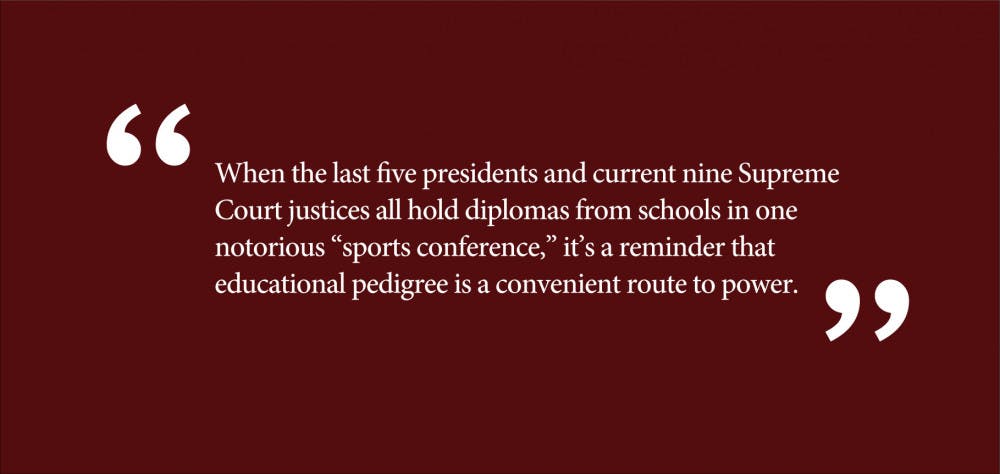At Brown, student activists have long called for an end to legacy admission. And there has been righteous outcry over The Herald’s report that Brown’s Office of Advancement gives special access to children of “alumni, parents and friends.”
Still, I think focusing on the unfairness of legacy admission misses the forest for the trees. Don’t get me wrong: Brown should give legacy status no weight in admission decisions. It says nothing about an applicant’s intelligence or ability. And it makes our already inaccessible admission process even more skewed against students without personal connections.
But the advantages of being a legacy are just a symptom of a more fundamental problem: the children of elite college graduates have numerous advantages when applying to join those elite universities themselves. Even if a Brown legacy applicant didn’t get special consideration at Brown, they’d still likely be well-positioned to go here, or to Harvard, or Williams or NYU … or any of the other schools in the top echelon of American higher education. That structural inequality — wherein a parent’s privilege shapes a student’s success — is a fundamental challenge to education’s perceived role as a societal equalizer.
Part of the problem comes from wealth. Elite colleges, as they are proud to advertise, do well by their graduates. The promise of future earnings is a big draw for many students. Along with some technical and engineering schools — who attract a different kind of student and don’t carry the same social status as more traditional universities — the list of colleges with the highest earning graduates largely matches existing college rankings.
Going to an elite school doesn’t guarantee anyone a huge payday. But when the last five presidents and current nine Supreme Court justices all hold diplomas from schools in one notorious “sports conference,” it’s a reminder that educational pedigree is a convenient route to power.
This matters because having parents with money is a huge advantage for college applicants. Colleges need to accept enough students that can pay full tuition; even with need-blind admission, admission officers know that the kid of a Yale-educated lawyer is likely not going to require much financial aid. Students with elite-educated parents often have access to the kinds of resources that make for successful applications: private school pedigrees, illustrious service trips, admission counseling, tutors … the list goes on.
Aside from financial resources, the status of having a parent with an elite degree confers its own set of benefits. At Brown, an alum connection might be enough to get an applicant a one-on-one professor meeting and a special note to the Office of Admission. The University even used to provide three hours of special college admissions counseling to the children of alums through the Alumni College Advising Program, even if they were not applying to Brown.
That program, though it will be discontinued after this summer, is a perfect example of how legacy admission is just a fraction of the problem. Going to Brown gets your kids in the door of going to any [insert similarly elite school name here]. Having a parent who knows the ropes is an invaluable resource; even if your family name isn’t also the name of a dorm, it pays in innumerable ways to come from a family where the admissions game is familiar, not riddled with mysteries. None of that changes if legacy admission is discontinued.
If colleges, especially elite ones like Brown, want to truly be the engines of social mobility like they claim they are, they need to radically rethink their role.
Elite colleges claim to be fair because they are meritocratic, taking those talented students from a diverse set of backgrounds who have the most talent and promise. Really, the schools operate more like this: admit mostly rich kids (Brown has more students from the top 1 percent than the bottom 60 percent of the income distribution), tout a commitment to diversity while enrolling grossly under-representative levels of low-income and students of color, give them all an elite pedigree (and a decent education, to be sure), and repeat.
Quietly, that pedigree reifies and reproduces itself, as the graduates propelled into society’s upper crust then seek to maintain that status. What results isn’t a meritocracy in any meaningful sense. It is, as Excellent Sheep author William Deresiewicz calls it, a “hereditary meritocracy”— a self-contradictory term indicative of the mental gymnastics our privileged classes need to do to justify their outsized influence in our lives and in our schools.
I’m not convinced that higher education should be a meritocracy. There’s a case to be made that it should much more explicitly be about providing a gateway to opportunity for underprivileged students everywhere. But if universities are going to try to act like they reward merit, let’s not just get rid of legacy admission; let’s make sure our universities are really open to all — not just those who already have fancy diplomas hanging on the walls of their family’s living room.
Aidan Calvelli ’19 has parents who attended elite northeastern liberal arts colleges, and recognizes that is largely why he is in a position to write this column at Brown. He can be reached for comment or called a hypocrite at aidan_calvelli@brown.edu.Please send responses to this opinion to letters@browndailyherald.com and op-eds to opinions@browndailyherald.com.





